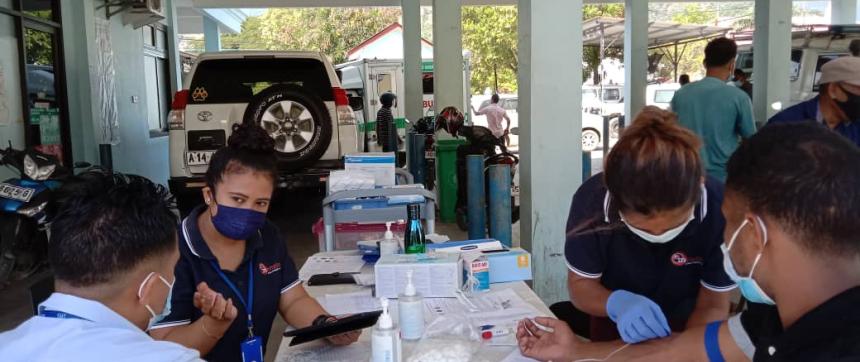 | News
| News
Understanding community infection in Timor-Leste through serosurveillance
Recent results from two different serosurveillance studies in Timor-Leste have painted a picture of the extent of immunity to several vaccine preventable diseases including COVID-19, measles, rubella, hepatitis B and dengue, in Timor-Leste.
The studies led by Menzies School of Health researchers with support from ARIA and NCIRS and the Ministry of Health in Timor-Leste measured antibody levels against infectious diseases which provide an estimate of population immunity due to past infection or through vaccination.
The use of residual serum samples to perform serological surveillance of severe acute respiratory syndrome coronavirus 2 in Dili and regional areas of Timor-Leste
Due to limited access to diagnostic testing outside of the capital city, Dili, the researchers also looked for antibodies to SARS-CoV-2 in blood samples collected in regional areas, to gain an understanding of immunity across the country.
From March to October 2021, this study monitored SARS-CoV-2 seroprevalence in residual serum samples derived from laboratories at five healthcare facilities across Timor-Leste.
The results showed that during the seven month period antibody prevalence increased significantly, due to vaccination and naturally acquired infection. Potential immunity gaps were also identified in children aged 0- 15 years (who were not eligible for vaccination at the time) and individuals aged 60 years and over.
This helped to highlight population groups with potential immunity gaps where epidemiological information is limited, and affirmed the need to sustain efforts to vaccinate vulnerable individuals.
Seroprevalence and prevention of hepatitis B, measles and rubella among healthcare workers in Dili, Timor-Leste
Results from a similar seroprevalence study focussing on healthcare workers were also recently released.
The World Health Organisation recommends that healthcare workers (HCWs) are immune to measles and rubella, and those at risk of exposure are offered the hepatitis B vaccine. No formal programme for occupational assessment and provision of relevant vaccinations to HCWs currently exists in Timor-Leste.
A cross-sectional study was undertaken to determine the seroprevalence of hepatitis B, measles and rubella among HCWs in Dili with all-patient facing employees at three health care facilities invited to participate.
Across April to June 2021, the study revealed significant immunity gaps and a high prevalence of hepatitis B infection among workers in Dili. Vaccination and assessment/management for hepatitis B infection were offered to relevant study participants.
It is hoped that this study will inform the development of a programme and national guidelines for the occupational assessment and vaccination of HCWs.
Both seroprevalence studies were conducted by Menzies through the ARIA-RISE project in partnership with the Ministry of Health Timor-Leste, Timor-Leste National Health Laboratory, ARIA and NCIRS, funded by the Indo-Pacific Centre for Health Security at Australian Department of Foreign Affairs and Trade.
Learn more about these projects on the ARIA hub: Seroprevalence study in Timor-Leste
